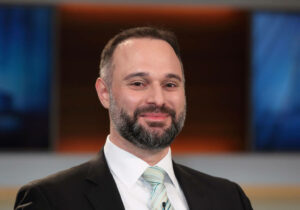A group of Germans with Turkish roots have formed a political group to compete in the European elections, sparking fears it could be a vehicle for Turkish President Recep Tayyip Erdoğan to expand his influence in the EU, Agence France-Presse reported.
Since its founding late last year, DAVA has come under intense scrutiny over its alleged links to Erdoğan’s ruling Justice and Development Party (AKP).
In an interview with AFP, DAVA strongly denied any connection, saying its main aim was to attract minorities with migrant backgrounds who currently feel unrepresented.
“We are not an offshoot of the [ruling] AKP in Turkey, we are not the extended arm of Erdogan,” Fatih Zingar, a lawyer and founding member of the Democratic Alliance for Diversity and Awakening, told AFP.

Rather, the group aims to address a “political vacuum” for Germans with foreign roots “who don’t see any political home, especially with the established parties,” the 44-year-old lawyer said.
Germany is home to the world’s biggest overseas community of people of Turkish origin, numbering around 2.8 million, many descendants of workers who came to the country to plug labor shortages in the 1960s and ’70s.
About half of this number still have only Turkish passports, while others have only German citizenship.
Erdoğan enjoys strong support among Turkish nationals living in Germany, and there has long been sensitivity about perceived attempts by Ankara to win influence in the country.
Still, DAVA insists it is focused solely on issues such as tackling anti-Muslim racism and unequal treatment faced by those with migrant backgrounds. Its first aim is to run in Germany for the European elections in June with 14 candidates.
Zingar said his group wants to secure at least one seat out of Germany’s 96, as there is no threshold to meet for the polls.
‘Gateway for foreign influence’
Critics are unconvinced by DAVA’s public statements, and some of the German press has dubbed it the “Erdogan party.”
Max Lucks — a lawmaker from the Green party, a member of Germany’s ruling coalition — said DAVA “draws its top staff and voters from AKP-affiliated organizations, or organizations that are directly controlled from Ankara.
“It stands to reason that it would also defend the AKP’s authoritarian policies,” Lucks, who is also the chairman and the German-Turkish parliamentary friendship group, told AFP.
Opponents of Chancellor Olaf Scholz’s coalition have seized on the issue to criticize the government for recently overhauling the law so people from many countries, including Turkey, can now obtain dual citizenship in Germany — and vote in the country’s elections.
The emergence of DAVA showed that changing citizenship laws was a “categorical mistake,” Thorsten Frei of the center-right CDU party told German media.
“This will be another gateway for foreign influence on German politics.”
There is evidence of links between the group’s candidates and Ankara.
Zingar, DAVA’s leading candidate for the European polls, used to be a senior figure in the Union of International Democrats, described as a lobbying organization for the AKP in Germany, although he no longer holds any positions in the organization.
Some other candidates that the party intends to field also have links to groups with purportedly close ties to Ankara, according to reports.
‘Don’t keep promises’
But Zingar, who was a member of Germany’s ruling SPD party for a decade before becoming disillusioned and quitting, insisted DAVA’s overarching aim was to create an alternative for people in Germany with foreign roots.
He also rejected the notion that setting up a group to attract people of foreign origin could actually worsen efforts to integrate minorities.
“In the past, especially when I was a child, I heard demands for people with a migrant background to become more politically involved — and now we are founding a new political association,” he said.
But Gökay Sofuoğlu, chairman of non-profit group the Turkish Community in Germany, predicted DAVA would fare poorly, saying previous attempts by people of Turkish origin in Germany to establish political parties had not gone well.
He conceded nevertheless that the attention around the organization highlighted that “there are many people who do not feel represented by established parties.”
Zukuf Cinentay, a Frankfurt restaurant worker from Turkey who has lived in Germany for a decade and who is seeking German citizenship, said even if he had the right to vote, he “would not vote for this party — or any other.
“Politicians always say they are going to do this and that, but they never keep their promises,” added the 26-year-old.



